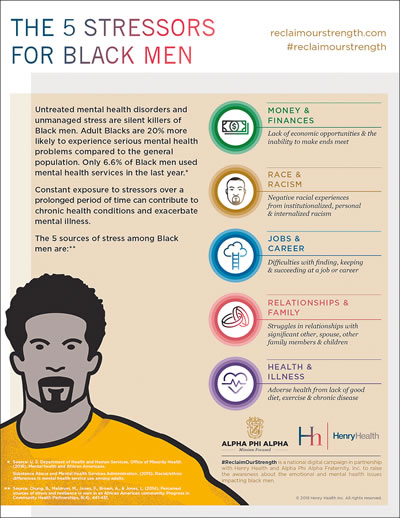Various reports have alerted about a growing trend in the number of middle aged men’s inability to cope with stressors (job loss, unfriendly socioeconomic realities, burden of meeting up with financial expectations, etc) often leading to health challenges such as stroke, hypertension and other complications; and in many instances, suicide. KEHINDE OYETIMI and MUHAMMED SUBAIR, with experts’ interventions, write on this worrying development.
Creative, resourceful and liable were the descriptions that fitted Richard. His job provided the financial autonomy that he craved. He had a closely knit immediate family and his company of friends was the circle that he wanted. With a beautiful wife, three kids, an apartment that spoke class and the many achievements and prospects ahead of him, life could only get better, or so, 44-year-old Richard imagined.
Before long, the tables began to turn; Richard lost his job. His once doting wife began to nag. The bills piled up. To cut down on the bills, he sold two of his cars, hoping to start a small-scale business from the proceeds. His once jolly friends were nowhere to be found. Even within the religious circle where Richard, his wife and kids were once tagged the ‘ideal God-ordained’ family, they had lost their sphere of influence. With the dwindling streams of income, his children could no longer attend their school of choice; twice he had to change their school.
Even the business which he felt would cushion the effects of the downturn could no longer hold. With tears in his eyes and a voice that quaked, “I have failed my family; I have failed myself. I wonder if life is worth living,” he said. While his wife worried over her husband’s mental wellness, Richard had turned down all entreaties to see a psychologist. For him, there was nothing manly about admitting failure before a shrink. “I’d rather end it all,” he said with a tone of finality.
Disturbing reports
Reports have established suicide as one of the biggest causes of death among men. The World Health Organisation in its 2016 global report, sighted by the Nigerian Tribune, puts estimated suicide deaths at 793,000, with men topping the gender divide. In the data collated, the WHO came to the conclusion that suicide remained the single biggest killer of men under the age of 45.
The painful pattern as observed by researchers have established the differences between attempted and completed suicides among the sexes to male using more lethal means to end their lives.
In Nigeria, as may be observed in some other developing, poverty-stricken countries, various factors have been adduced for the growing trend.
Stressors, burdens
While speaking with the Nigerian Tribune, Niyi Oluwarotimi, a Benue-based psychiatrist, argued that “It is indeed true that we are recording a large number of middle aged men who are dying as a result of stroke, hypertension and many other health complications. The reasons should be clear. The Nigerian socioeconomic landscape is troubling.
“In the last few years, the burden of raising a family has become very disturbing. Many men have lost their jobs. Look at the problems. A man is the breadwinner of his home. He has to pay house rent, school fees, feed his family, attend to many other pressing demands. Look at the rate at which utility bills go up. How then, do you expect many of these men not to have serious health challenges? Many men are walking away from their families and responsibilities. Some are committing suicide. Many are down with stroke and heart-related conditions.”

“Since I lost my job, it’s been hell taking care of my family”
Mr Joseph Kolade once worked in one of the new generation banks. Now in his early 50s, he told Nigerian Tribune of the burden of taking care of his family.
“My friends and I worked in one of the banks. We were asked to leave at the middle of last year. My family used to be in Lagos. I had to move them to Osogbo. When I lost my job, things became really bad. I lost two of my friends after they felt really depressed. One of them ended his life. The other developed a heart problem and later died. I also remember another one who is down with stroke. He is 51.
“As I speak with you, I have become hypertensive. I can’t feed my family anymore. Where do I start from? Even the pension managers that we relied on have become very evasive. It is really sad and worrying. At a point, I got a loan from a man with which I bought a car to operate a car service business. I was involved in an accident which was due to no fault of mine. I have not been able to pay what I borrowed. It is hell,” he said.
Dr Yetunde Onajin, a psychiatrist and founder, Nature’s Crest Home and Rehabilitation Centre in Lagos, explained to Nigerian Tribune that “a stressor is a psychological construct of any event which has both negative and positive impacts on the mental process of a man and hinders his function socially, emotionally, occupationally, and spiritually.”
Highlighting stressors in a man’s life, she fingered “late childbearing, job loss, youth unemployment, which has attained an alarming proportion, bereavement occasioned by death of loved ones, insecurity and heightened crime rates are forms of negative stressors while the joy of giving birth, planning for marriage, excelling in one’s academic pursuits and other positive life events are instances of positive stressors.”
Commenting on the psychological impacts of stressor, she said “anxiety, depression, low self-esteem, poor self-concept, anger, resentment and chronic conditions such as schizophrenia, bipolar affective disorder, depression with psychosis are few of the influences of stressors on human psychology. Also, unguarded and immoderate religious worship and pressure of payment of school fees can also bring about a chronic stressful condition onto man and as such kill him psychologically and physically.”
She stated further that the burden imposed on a man by nature and the cultural and social constructs which dictate that a man must fend for his family are likely to overwhelm him if he is unable to meet-up with expectations.
Why men hardly seek psychological help
Colman O’Driscoll, former executive director of operations and development at Lifeline, an Australian charity providing 24-hour crisis support and suicide prevention services, identifies communication as key element in averting crisis in men. She argues that for generations, many societies have encouraged men to be strong and not admit they are struggling.
According to her, “It often starts in childhood. We tell boys that boys don’t cry. We condition boys from a very young age to not express emotion, because to express emotion is to be weak.”
Sharing same thread, Mara Grunau, executive director at the Centre for Suicide Prevention in Canada, while being quoted by the BBC, pointed out “It’s how we talk to our children and how we encourage them to communicate about themselves too. Mothers talk way more to their girl children than their boy children… and they share and identify feelings more. We almost expect women to be emotional.”
In identifying the stressors and reasons that may be responsible for this trend, Director, World Health Organisation (WHO) Collaborating Centre for Research and Training in Mental Health, Neurosciences and Substance Abuse, Department of Psychiatry, University of Ibadan, Professor Oye Gureje, told Nigerian Tribune that despite the absence of a mandatory data base to this, the reportage by the media of rising health crises in middle aged men should be worrying.
According to him, “When you find something making the news, then attention should be given to it, the public becomes more inclined to talk about it. One of the most common reasons why people kill themselves in this instance is depression. Women with psychological problems tend to seek care much more readily than men. If you go to clinics around the world, not just in Nigeria, you will find out that 70 per cent of those being attended to are women. This is so because women tend to not cover up their own problems whether psychological or physical. If people don’t receive care for an underlying problem, then it can lead to tragic ends like committing suicide.
“In many parts of the world, especially like ours, men tend to be the breadwinners. When economic downturns occur, men tend to bear the brunt more than women. It is not really that women are not affected but the burden of finding a solution to the problem rests on the man. A result of that could be the feeling that life is not worth living.
“There are various ways of solving these problems. Government policies must improve the economy; jobs should be available; there should be employment security. When people lose their jobs, they should not be allowed to go into penury. There should be some social security for them.”

Dr Abraham Olorunmibe of Frabams Hospital, Suleja, Niger State, in an interaction with Nigerian Tribune stated that “a lot of men don’t take conscious care of their health. They don’t go for medical checkups. Even when their bodies give them signs, they ignore them. But they immediately take their wives, children and other loved ones for medical care once there is a slight reason to do so. Many men don’t value their own lives, forgetting that their families depend on them. So, death can strike at any time, especially through hypertension.”
Possible solutions
Health experts have also argued that in order to curb this trend, there must be conscious effort to address these challenges. While there are no straightforward fixes to these challenges, policies and programmes can help in this direction.
Overall, there’s an emphasis on “making it okay for men to talk about how they’re feeling – and for that to be acknowledged as a sign of strength”, says O’Driscoll.
According to Dr. Onajin, “With a positive thinking mode in all these situations, it is possible for an individual to reduce the impact of stressful life events on himself. Adopting an emotional solution could also help in bringing about reduction in the impacts of stressors in a situation where the actual problem or issues cannot be changed or resolved.”
While cautioning against the use of psychoactive substances like marijuana, cocaine, alcohol, opium, codeine, tramadol, heroin, amphetamine, cigarette and so on to eliminate the impact of stressor, she added that “the adoption of relaxation techniques such as meditation, regular exercise, positive thinking, sharing of problem with spouse and trusted friend, positive lifestyles, knowing when to take a break and having adequate sleep can help cope with stressors.”
For the duo of Dr Mustapha Bello of the Department of Religious Studies, Lagos State University, Ojo, and Founder, Royal House of Faith International, Lekki, Lagos, Pastor Bassey James, having a positive outlook and faith in God can help lighten burdens.
Dr Bello insists that absence of good governance, lack of basic amenities, unemployment and poverty which stare many homes in the face, with the inability to meet up with domestic needs are causes of psychological breakdown in most men.
According to him, “man has a huge responsibility to take care of the needs of his family and in fulfilling these duties, he subjects himself to varying degrees of psychological and physical stress which cuts short his life and punctures his health.
“It is however unfortunate that the situation in which we have found ourselves in this country does not allow for easy discharge of these responsibilities. It is in Nigeria that an able-bodied man is jobless and unable to fend for himself not to talk of providing for his family.”
Pastor Bassey, on his part, stated that “regardless of the extent of the stress, we should have control over our lives and not allow any affliction or stress to deprive us of the joy of living. We have heard and seen cases of suicide and stress-related deaths caused by poverty, despair and stress. We need to teach ourselves on how to live right and understand that suicide, despair, depression are not solutions to a stressful life.”






